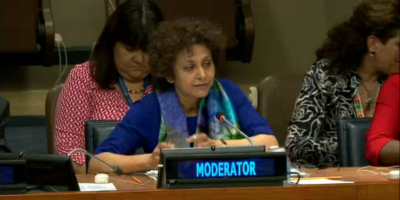
‘No-one left behind is of course a very ambitious endeavor but it is absolutely essential if Agenda 2030 is to be transformative,’ stressed Irene Khan, Director General of the International Development Law Organization (IDLO) at the first meeting of the UN High-Level Political Forum on Sustainable Development (HLPF) since the Sustainable Development Goals (SDGs) were agreed last September.
The HLPF is the main platform for the follow-up and review of the 2030 Agenda for Sustainable Development. Ms. Khan was moderator of a panel event entitled ‘Ensuring that no one is left behind: Creating peaceful and more inclusive societies and empowering women and girls’.
Opening the panel, Ms. Khan called on participants to consider ‘how the issue of building inclusive, peaceful societies, particularly with the support of women and girls and for the benefit of women and girls, can help us advance the 2030 Sustainable Development Agenda.’
Lakshmi Puri, Assistant Secretary-General of the United Nations and Deputy Executive Diretor of UN Women, drew attention to the fact that ‘at the current pace of change, it would take another century (to achieve equality) so we have to telescope progress in the next fourteen and a half years’.
Agenda 2030 is about ‘achieving not just promoting gender equality, and empowering all women and girls in all their diversity’, she urged.
Robert J. Berg, Chair of the Alliance for Peacebuilding and Trustee at the World Academy of Arts and Science, spoke of the changing nature of conflict and of a recent meeting which brought together leading practitioners in mediating disputes; 80%, he said, were women. A phenomena reflected in the number of women studying peace studies at universities, where the ratio, he said, was as high as 27:1. ‘The question’, he suggested, ‘was to involve women leaders and women’s groups, who are sensitive to the conflict costs to women particularly, and to make them great peacemakers.’
For Beatrice Ayuru, Founder of Lira Integrated School, the answer lies in education, she argued that education systems often fail women and girls and leave them out. She called for a system, which includes more practical skills like entrepreneurship and which addresses the challenges that women and girls face. But, she added, that this should not be at the exclusion of men.
Gaia Gozzo, Head of Governance at CARE International, spoke of the importance of monitoring, particularly in relation to Goal 16 of the SDGs, and the need for age and sex disaggregated data.
Fittingly, ‘a good, first step to start a discussion on leaving no-one behind,’ Anca Ruxandra Gliga, Advocate at the United Network of Young Peacebuilders and UN Major Group for Children and Youth, reminded those present ‘is to look around and ask ourselves … who is missing? Most likely those not in the room are the ones left behind.’
Read more on the HLPF sessions
Webcast

